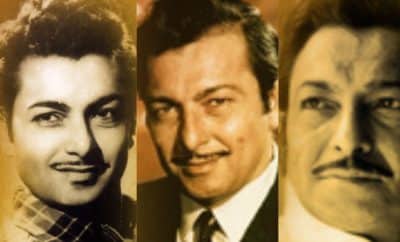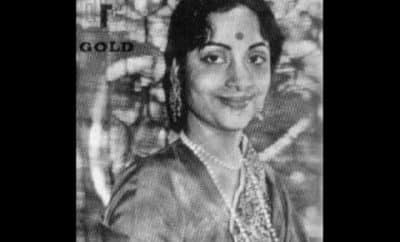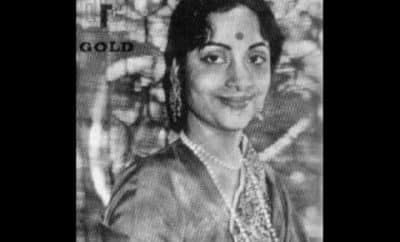Legends
An Ode to Forlorn Nightingale – Geeta Dutt
No one can deny the fact that it was Geeta Dutt, who brought important changes to singing in Indian film music.
Geeta was born on 23rd November of 1930 in Faridapore of East Bengal – today’s Bangladesh. She was the first-born of ten children. She was fondly called ‘Ranga’. Geeta’s childhood passed pleasantly in music and literature. She was twelve when the family started life afresh in Bombay. They stayed in a small room of a crowded colony in Dadar. Music composer Hanuman Prasad, who was passing by, heard the melodious voice of Geeta singing from the common balcony of her house. He brough Geeta to his studio and made her sing in his film ‘Bhakta Prahalad’. She only sang a few lines and part of the chorus in the film. It was also heard by the great composer S.D. Burman. He was so impressed that he called Geeta and made her sing in his next film ‘Do Bhai’ in 1947. S.D. Burman who recognized the magical attraction of Geeta’s voice. ‘Mera Sundar Sapna Beet Gaya’ sung by her in the same film was a super hit song. With this she climbed the ladder of fame instantly. The film ‘Do Bhai’ was a huge success because of the success of Geeta’s songs.
What makes her voice immortal is that when we listen to her songs, you can’t help appreciating the effortless ease with which she swings and flies through the songs given to her. Her natural singing style was not familiar with classical techniques of singing, but she was able to bring to all the songs that she sang a rare feel. Her classical feminine beauty made her the most beautiful singer among Indian singers. Geeta’s voice was a fresh breeze and rain cloud combined. Geeta belted out soft, sultry, happy, snappy, romantic, teasing or tragic numbers. Dekho Jadoo bhare more nain, Dil hai deewana jawan hai zamana (Aasmaan-1952) Zara samne aa zara aankh mila, Ai dil ai deweewane (Baaz 1953). Aar-Paar (1954) songs like Hoon abhi main jawan, Babuji dheere chalna.. were aural wines. Geeta’s resplendent voice in Thandi hawaa kali ghataa.. (Mr & Mrs 55) still brings a girly charm to the listeners.
In her early days, Geeta Dutt mostly sang sad songs and bhajans. In 1951 when ‘Baazi’ was released, the situation changed. In this film, composer S.D. Burman took a novel track and created a new base for Geeta’s voice. Songs like ‘Tadbeer se Bigdi Hui Taqdeer Bana De’ became big hits. Geeta’s voice which negotiated the western tunes with a rare verve and zing, sounded young and glamorous in these songs. They spawned emotions of love with ease. Her career evolved with Guru Dutt, and her voice gained octaves. A new meaning was given to her career when S.D. Burman and O.P. Nayyar chose her and they gave her voice a new dimension. Geeta’s sense of rhythm and cadence were impeccable. She did not, however, follow the established norm of singing in a ghazal-motivated voice. She introduced a free flowing style of singing that relied on spontaneous expressions rather than trained vocals. Her voice could render a wide range of emotions and had an inner fire that vindicated the song’s existence. She could spiritualise a lyric and make it sensuous at the same time.
Unfortunately the bloom period lasted for a short span. Plagued by a host of personal problems, chief among them a troubled marriage, Geeta’s singing career began to get affected. She took to drinking and then fell ill. With Guru Dutt’s demise in 1964, Geeta suffered a nervous breakdown. She ultimately succumbed to cirrhosis of liver and passed away on 20 July 1972. Had she not fallen prone to severe drinking, Geeta Dutt’s repertoire of songs would have been awesome. Even now, the numerical strength of her renditions may be small, the qualitative-ness of her songs still make it appear that she has held sway over the female crooning till the time she was alive.
“Mera sunder sapna beet gaya, mai prem mein sab kuch haar gayi, bedard zamaana jeet gaya……….” the song which brought her stardom, encapsulates the story of her life as well.



